|
|
|
Sort Order |
|
|
|
Items / Page
|
|
|
|
|
|
|
| Srl | Item |
| 1 |
ID:
098152
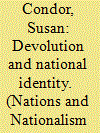

|
|
|
|
|
| Publication |
2010.
|
| Summary/Abstract |
In this article I consider why the expected English backlash to the asymmetric UK devolution settlement has not yet materialised. Using a corpus of conversational interviews, I discuss the various ways in which people in England currently understand the relationship between national identity and political entitlement. I conclude that English political quiescence, far from constituting an enigma, is comprehensible in the light of the fact that members of the general public do not usually base their assessments of political legitimacy on calculations of English national self-interest defined in contrast to Scotland. Rather, political issues tend to be judged with reference to principles of equity and procedural justice. English identity is rarely considered legitimate grounds for political voice. Rather, people are inclined to demonstrate a concern to balance the recognition of Scottish rights to national self-determination, with a display of public reason, civility and civic responsibility understood to be normatively incumbent upon the English majority.
|
|
|
|
|
|
|
|
|
|
|
|
|
|
|
|
| 2 |
ID:
117518


|
|
|
|
|
| Publication |
2012.
|
| Summary/Abstract |
International Relations scholars have long debated whether the American public is allergic to realism, which raises the question of how they would "contract" it in the first place. We argue that realism isn't just an IR paradigm, but a belief system, whose relationship with other ideological systems in public opinion has rarely been fully examined. Operationalizing this disposition in ordinary citizens as "folk realism," we investigate its relationship with a variety of personality traits, foreign policy orientations, and political knowledge. We then present the results of a laboratory experiment probing psychological microfoundations for realist theory, manipulating the amount of information subjects have about a foreign policy conflict to determine whether uncertainty leads individuals to adopt more realist views, and whether realists and idealists respond to uncertainty and fear differently. We find that many of realism's causal mechanisms are conditional on whether subjects already hold realist views, and suggest that emotions like fear may play a larger role in realist theory than many realists have assumed.
|
|
|
|
|
|
|
|
|
|
|
|
|
|
|
|
| 3 |
ID:
126342


|
|
|
|
|
| Publication |
2013.
|
| Summary/Abstract |
Political knowledge today is studied primarily at the explicit level. Measures of political knowledge often rely on testing whether voters are aware of various "facts" about political life, such as the names and offices of prominent political actors, the institutional structures of the political system, and the ideological or policy differences between the major political parties (e.g., Delli Carpini and Keeter 1996). These various kinds of political information are considered to be important by political scientists and other social scientists because they facilitate the informed voting decisions that are needed to hold elected leaders accountable (e.g., Lau and Redlawsk 2006; Pande 2011).
|
|
|
|
|
|
|
|
|
|
|
|
|
|
|
|
| 4 |
ID:
107442
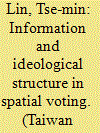

|
|
|
|
|
| Publication |
2011.
|
| Summary/Abstract |
This article aims at unifying the theory of spatial voting and the theory that is
variously called conceptualization, information, or sophistication. Following
Downs's early insights on uncertainty as well as recent developments in both
literatures, I argue that it is of critical importance that spatial voting models
explicitly incorporate information effects. For this purpose, I develop a
heteroskedastic probit model that allows for the specification of information
heterogeneity. This model is applied to the Taiwan Election and Democratization
Study's 2004 post-presidential election survey data. In 2004, Taiwan's political
landscape was dominantly defined by the Green vs. Blue ideological cleavage,
and the candidates were perceived as taking divergent positions. This article
investigates the effects of information and activism on the spatial structure and
their implications on candidates' strategies. My findings confirm the existence
of these effects on voter uncertainty in the framework of spatial analysis.
1
|
|
|
|
|
|
|
|
|
|
|
|
|
|
|
|
| 5 |
ID:
148128
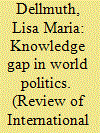

|
|
|
|
|
| Summary/Abstract |
The past decades have seen a significant expansion in the scope and authority of international organisations (IOs), raising questions about who participates and is represented in the public contestation of IOs. An important precondition for citizens to become critically involved in the public debate about an IO is that they are aware of the politics of that IO. This article sheds light on this largely unexplored issue, asking why some citizens are more aware of IOs than others. This question is examined in the context of a powerful international organisation, the United Nations Security Council. Using a multilevel analysis of citizens in 17 Asian and European countries, this article argues that citizen knowledge about the Council is shaped by economic conditions and cosmopolitan identity. Higher levels of knowledge are found among the wealthier, and there is some evidence that income inequality depresses knowledge among poorer citizens. Furthermore, citizens identifying with groups or individuals across nation-state borders are more likely to know more about the Council. The article sketches broader implications for the study of the politicisation of IOs and citizen representation in the public contestation of IOs.
|
|
|
|
|
|
|
|
|
|
|
|
|
|
|
|
| 6 |
ID:
126129


|
|
|
|
|
| Publication |
2013.
|
| Summary/Abstract |
For the legislative elections in 2008, Taiwan introduced a new mixed-member majoritarian (MMM) electoral system to replace the single non-transferable vote (SNTV) system that had been in place for half a century. The new MMM system is a sharp departure from the original SNTV system in several institutional designs. Whether the Taiwanese public is ignorant or fully aware of the new electoral system has attracted the attention of many Taiwanese scholars. By taking advantage of survey data conducted between 2007 and 2011, we aim to examine in this research the level of the Taiwanese public s awareness of the new MMM electoral system in the 2008 and 2012 elections, investigating whether most voters are knowledgeable of the new electoral system. We also test whether holding legislative elections concurrently with the presidential election influences the effect of political campaigns on people's learning of electoral knowledge. Furthermore, the extent to which people's knowledge of electoral systems influences their voting participation is also included in our analysis. The findings of this study indicate that the majority of citizens were not fully aware of the institutional components of the new MMM system in the 2008 and 2012 elections. We also confirm that political campaigns play an important role in enriching citizens' electoral knowledge. Citizens' knowledge of the electoral system rises as the election date approaches and declines after the election is held. Moreover, concurrent presidential and legislative elections did negatively impact the relationship between political campaigns and electoral knowledge. The learning effect of electoral knowledge in the 2012 concurrent elections was not as significant as that in the 2008 legislative election. In addition, our findings also reveal a positive relationship between electoral knowledge and voting participation, suggesting that citizens who are more knowledgeable of the electoral system were more likely to vote in the 2012 legislative election.
|
|
|
|
|
|
|
|
|
|
|
|
|
|
|
|
| 7 |
ID:
131690
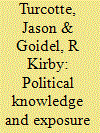

|
|
|
| 8 |
ID:
144830
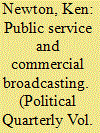

|
|
|
|
|
| Summary/Abstract |
This article provides an accessible overview of the growing research literature on the impact of public service and commercial broadcasting and highlights its main implications for policy discussions about the future of public service broadcasting in Western societies. It shows that the populations of countries with public service broad- and narrowcasting are better informed about government and politics, are more trusting of other people, have more positive civic attitudes, have greater confidence in democratic institutions and are more likely to engage in democratic politics. Moreover, levels of social trust are higher in countries which have a significant public service element in their media systems, even among individuals who do not habitually watch public TV channels. The article ends with a brief discussion of the implications of this research for the future of public broadcasting in the Western world.
|
|
|
|
|
|
|
|
|
|
|
|
|
|
|
|
| 9 |
ID:
097821
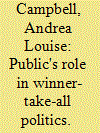

|
|
|
| 10 |
ID:
174471


|
|
|
|
|
| Summary/Abstract |
What is political knowledge? We argue that the traditional measure of political knowledge is limited, as it represents one domain of facts that people should know about American politics. This domain of knowledge is rooted in the liberal-democratic face of the state and neglects other political knowledge generated from the carceral face of the state. We argue that knowledge of carceral violence, especially against African Americans, represents a separate domain of knowledge that is particularly relevant to marginalized communities, especially black youth. Once we include carceral violence in our measures of political knowledge, established patterns of whites having more political knowledge than Blacks are reversed. Using a novel measurement strategy and based on a nationally representative survey of over 2,000 young people, we find that knowledge of carceral violence is distinct from measures of what has been called general political knowledge. Finally, we find that knowledge of carceral violence has distinct correlates from the standard knowledge battery and its relationship to political participation varies by racial group but tends to depress the political participation of African Americans. Our findings raise the question of what comprises relevant and important political knowledge today and for which communities.
|
|
|
|
|
|
|
|
|
|
|
|
|
|
|
|
| 11 |
ID:
133254
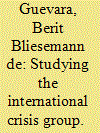

|
|
|
|
|
| Publication |
2014.
|
| Summary/Abstract |
This special issue studies the International Crisis Group (icg), one of the most notable and widely referenced producers of knowledge about conflict areas, used extensively by policy makers, the media and academics. The authors take different theoretical and methodological approaches to make sense of this hard-to-ignore conflict expert, exploring the icg's daily operations and role in international politics. This introduction sets the scene by offering a critical exploration of the organisation and its approach to the construction of political knowledge. It analyses the icg's position in the conflict-related knowledge market and the sources of its expert authority. It then discusses the organisation's roles - from mediation to instrumentalisation - in the 'battlefield of ideas' in conflict and intervention contexts and its potential to make an impact on policy framings and outcomes. It shows that studies of the icg need to 'unpack' the organisation in order to account for it as both a highly successful international expert brand and a very heterogeneous actor in specific contexts and at specific times.
|
|
|
|
|
|
|
|
|
|
|
|
|
|
|
|
| 12 |
ID:
148657
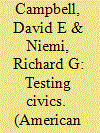

|
|
|
|
|
| Summary/Abstract |
Do state-level exams in civics have a positive impact on young people's civic knowledge? We hypothesize that civics exams have the biggest effect in states where they are a requirement for high school graduation—the incentive hypothesis. We further hypothesize that civics requirements have the biggest effect on young people with less exposure to information about the U.S. political system at home, specifically Latinos and, especially, immigrants—the compensation hypothesis. We test these hypotheses with the 2006 and 2010 National Assessment of Educational Progress (NAEP) civics test administered to high school students, and with a large national survey of 18–24 year-olds. Across the two datasets, we find modest support for the incentive hypothesis and strong support for the compensation hypothesis.
|
|
|
|
|
|
|
|
|
|
|
|
|
|
|
|
| 13 |
ID:
133242
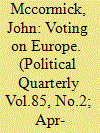

|
|
|
|
|
| Publication |
2014.
|
| Summary/Abstract |
As Britain prepares for a possible referendum on continued membership of the European Union, it is essential that more careful thought is paid to the dynamics of referendums. Polling data reveal the existence of a substantial knowledge deficit in the UK and other parts of the EU: large numbers of voters simply do not understand the EU. There is also reason to question the conventional view that voters can correct for such a deficit by using cues from opinion leaders and the media. The experience of recent referendums in other EU member states suggests that many voters will take part in the proposed British referendum without independent and informed knowledge of the issues at stake, that many will have been swayed by partisan elite opinion, and that many will decide on the basis of their views about domestic politics rather than their views about Europe.
|
|
|
|
|
|
|
|
|
|
|
|
|
|
|
|
| 14 |
ID:
096282


|
|
|
|
|
| Publication |
2010.
|
| Summary/Abstract |
While studies typically find that women know less about politics than do men, feminist scholars have argued that these findings reflect gender-biased measures that underestimate women's political knowledge. This article evaluates the feminist critique by taking a more expansive view of what constitutes political knowledge. Using data from a large Canadian urban sample, we show that gender gaps close or even reverse when people are queried about more practical aspects of political knowledge, such as government benefits and services. Our results also demonstrate that this type of knowledge is more equally distributed than its conventional counterpart, though the women who are the most likely to need government services and benefits are often the least likely to know about them. Finally, we show that knowledge of government services and benefits has a significant effect on women's intended vote choice. This article thus shows that more practical types of political knowledge might serve as meaningful additions to existing definitions and measures of political knowledge.
|
|
|
|
|
|
|
|
|
|
|
|
|
|
|
|
|
|
|
|
|